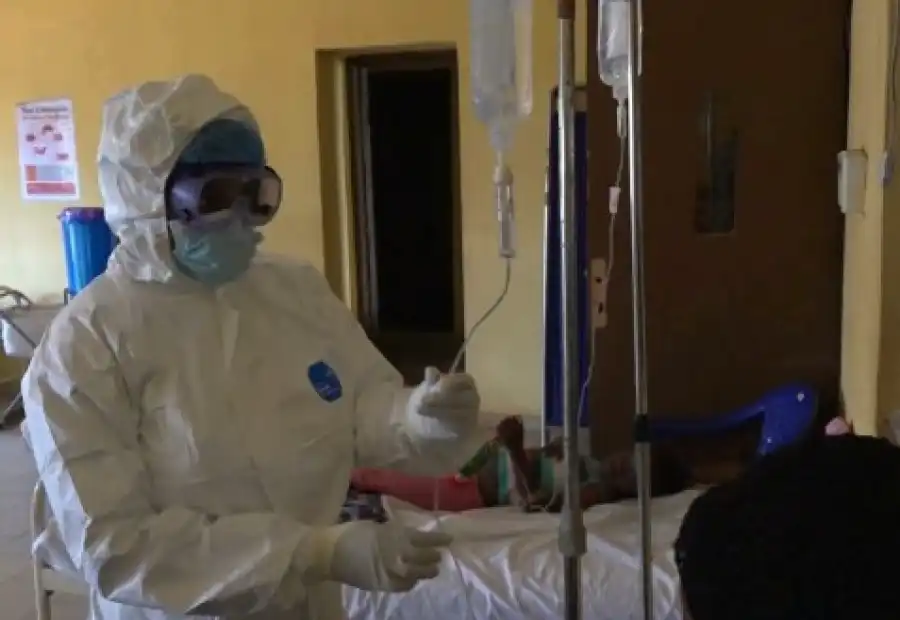Lassa fever toll now 161 as two doctors, 14 others die in Bauchi

Lassa fever toll now 161 as two doctors, 14 others die in Bauchi
Bauchi State Surveillance Support Officer, Dr. Suleiman Lawal, on Wednesday said two medical officers and 14 others have died from Lassa fever disease in the state.
The state had recorded a total of 43 confirmed cases since January.
Lawal disclosed this during an interactive session with the media at the Lassa Fever Camp, Abubakar Tafawa Balewa University Teaching Hospital.
“Bauchi State has recorded 43 confirmed cases of Lassa fever, but two out of this number were brought in from Plateau State. Among the confirmed cases, 16 deaths were recorded this year,” he said.
“Three people died of probable cases. They were called ‘probable cases’ because we could not take their samples before they died.
“Totally, we have seven health workers that were infected. One of the doctors was pregnant. We managed and discharged her.
“Four others are currently on admission and we have been managing them. They are now stable. We will discharge two of them today because they have finished their 10-day treatment period.
“Two doctors died — one in ATBUTH and the other one died in a private clinic here in Bauchi.
“Most of the deaths were as a result of reporting late, and that is not our fault. We appeal to people to always report on time,” he advised.
Lawal noted that the state received assistance from the World Health Organisation and the UNICEF, as part of efforts aimed at reducing the scourge of the disease to the barest minimum.
Meanwhile, the National Centre for Disease Control says Lassa fever death toll has increased to 161.
Director-General, NCDC, Dr. Chikwe Ihekweazu, said this on Wednesday in Abuja, while giving the 11th week update on Lassa fever outbreak in the country.
The NCDC boss said in the update that four health workers, three in Bauchi and one in Gombe, were among the dead.
He said, “The number of suspected cases has increased significantly, with 3,735 suspected cases and a total of 906 confirmed cases.”
Ihekweazu said the increase was as a result of reported new cases in 12 states which include Edo, Ondo, Ebonyi, Bauchi, Taraba, Plateau, Kogi, Delta, Enugu, FCT, Nasarawa and Gombe.
The director-general said 123 local government areas across 27 states had been affected so far.
“Ondo and Edo are the worst hit states, with 15 and 11 confirmed cases respectively; while 78 patients are currently being managed.
According to him, of all confirmed cases, 73 per cent is from three states, Edo (33 per cent), Ondo (32 per cent) and Ebonyi (seven per cent).
He said NCDC had continued to scale up its preparedness and response for Lassa fever outbreak across the country.
“We have continued to train health workers from the major treatment centres. Risk communications had increased and logistics had also improved to ensure continuous supply of medical and laboratory commodity.
“National Rapid Response Teams have been deployed from NCDC to support response activities in nine states.
“The five molecular laboratories for Lassa fever testing in the NCDC network are working full capacity to ensure that all samples are tested and results provided within the shortest turnaround time”.
He said NCDC was working to support every state in Nigeria to identify one treatment centre, while supporting existing ones with care, treatment and IPC commodities.”
Ihekweazu said that NCDC had also provided infection prevention control guidance for all health workers in the country, calling on all involved to make use of it.
He reiterated that NCDC would continue to support affected states through deployment of inter-disciplinary Rapid Response Teams and provision of medical supplies including Rivabrin for treatment of Lassa fever patients.
The NCDC boss called on Nigerians to continue to keep their environments clean and store food in tight containers to avoid contact with rats.
Lassa fever is an animal-borne, or zoonotic, acute viral illness that is spread to humans through food or household items contaminated with rodent urine or feces.
Symptoms include high fever, headache, mouth ulcers, muscle aches, hemorrhaging under the skin and heart and kidney failure.
The illness was discovered in 1969 and is named after the town in Nigeria where the first cases occurred.

{{comment.anon_name ?? comment.full_name}}
{{timeAgo(comment.date_added)}}
{{comment.body}}
{{subComment.anon_name ?? subComment.full_name}}
{{timeAgo(subComment.date_added)}}
{{subComment.body}}